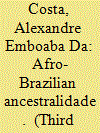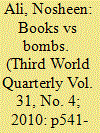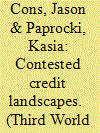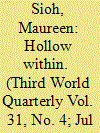| Srl | Item |
| 1 |
ID:
097215


|
|
|
|
|
| Publication |
2010.
|
| Summary/Abstract |
This article 'thinks with' an Afro-Brazilian mobilisation of ancestralidade (ancestrality) as a means to explore, unmask and mark the centrality of 'race' in development. In contrast to thinking about race as cultural difference necessitating inclusion in development, thinking with Afro-Brazilian knowledge aims to rework the very category of development. 'Thinking with' engages critical knowledge emerging out of Afro-Brazilian struggles to forward a theory and practice of substantive political, institutional and social transformation. The article juxtaposes the culturalisms of national ideology and multicultural development policies with ancestralidade as a dynamic political practice that contests capitalism's racialised hierarchies while embodying another sociality of development. An analysis of one cultural centre's efforts to restructure the school curriculum demonstrates that the 'past' of racialised capitalism and ancestral memory are each contemporary projects which evince the relational formation and contested meaning of 'race' in development.
|
|
|
|
|
|
|
|
|
|
|
|
|
|
|
|
| 2 |
ID:
097200


|
|
|
|
|
| Publication |
2010.
|
| Summary/Abstract |
Through the lens of the new institutional economics development is represented as a process of cultural and institutional transformation in which informal social institutions that hinder the operation of market forces are dismantled and replaced with formalised, liberal institutional frameworks to facilitate rational economic activity. The World Bank has deployed these arguments to legitimise reforms aimed at reshaping the values and conduct of postcolonial citizenries to facilitate entrepreneurship and competitiveness. To deconstruct this discourse, the article points to its underlying contradictions; specifically, to the way that the idealised formal rationality of impersonal markets is necessarily subsumed in practice within the substantive irrationalities of capitalist development. Consequently the informal social relations that the Bank deems instances of cultural atavism and a barrier to competitiveness arise as intrinsic features of global capitalism. Seemingly impervious to reform, informalised populations appear as objects to be restrained or removed by the state. Coercion, I argue, emerges as the inevitable concomitant of competitiveness.
|
|
|
|
|
|
|
|
|
|
|
|
|
|
|
|
| 3 |
ID:
097203


|
|
|
|
|
| Publication |
2010.
|
| Summary/Abstract |
In 1997-98 East and Southeast Asia experienced a region-wide financial crisis that saw national currencies lose 75 per cent of their value and stock markets wiped out. The financial crisis became an antagonistic and racialised referendum on Asian values between certain Asian governments and their Western critics. What was the larger political significance of this focus on Asian values? Focusing on the Malaysian government's controversial decision to go against the international financial community by implementing capital controls during the crisis, I argue that the debate over Asian values can be understood as performances to challenge and psychologically defend the conventional hierarchy of international relations that followed its symbolic disruption through the economic success of the regional economies before the crisis.
|
|
|
|
|
|
|
|
|
|
|
|
|
|
|
|
| 4 |
ID:
097212


|
|
|
| 5 |
ID:
097205


|
|
|
|
|
| Publication |
2010.
|
| Summary/Abstract |
In 1997-98 East and Southeast Asia experienced a region-wide financial crisis that saw national currencies lose 75 per cent of their value and stock markets wiped out. The financial crisis became an antagonistic and racialised referendum on Asian values between certain Asian governments and their Western critics. What was the larger political significance of this focus on Asian values? Focusing on the Malaysian government's controversial decision to go against the international financial community by implementing capital controls during the crisis, I argue that the debate over Asian values can be understood as performances to challenge and psychologically defend the conventional hierarchy of international relations that followed its symbolic disruption through the economic success of the regional economies before the crisis.
|
|
|
|
|
|
|
|
|
|
|
|
|
|
|
|
| 6 |
ID:
097207


|
|
|
|
|
| Publication |
2010.
|
| Summary/Abstract |
This article contests the characterisation of the popular and acclaimed film, Slumdog Millionaire, as a realistic portrayal of India's urban poverty that will ultimately serve as a tool of advocacy for India's urban poor. It argues that the film's reductive view of slum-spaces will more probably reinforce negative attitudes towards slum-dwellers, lending credibility to the sorts of policies that have historically dispossessed them of power and dignity. By drawing attention to the film's celebration of characters and spaces that symbolise Western culture and Northern trajectories of 'development', the article also critically engages with some of the issues raised by the film's enormous success.
|
|
|
|
|
|
|
|
|
|
|
|
|
|
|
|
| 7 |
ID:
097197


|
|
|
|
|
| Publication |
2010.
|
| Summary/Abstract |
One year after the 2008 crash, policy makers and international lending institutions declared the crisis over and assured the world that recovery was underway. The efforts of the Group of Twenty (G20) have been widely credited with securing economic recovery. In this article I examine the politics of representation of the crisis by the G20. I argue that the G20 summits have served to naturalise and depoliticise the crisis, thereby legitimating a narrow and very particular response to it. The politics of representation is bound up in what I term 'financial fetishism'. To demonstrate and explain how and why the G20 summits have engaged in a politics of representation alongside a politics of management, I proceed from an abstract to a concrete level of analysis by, first, revealing the social construction of neoliberal-led growth and the subordination of all social life to the rationality of the market, and, second, comparatively exploring the discourse of the G20 summits of 2009 and their predecessor: the New International Financial Architecture of 1999.
|
|
|
|
|
|
|
|
|
|
|
|
|
|
|
|
| 8 |
ID:
097210


|
|
|
|
|
| Publication |
2010.
|
| Summary/Abstract |
This article studies political theatre as a space of political economy. When conceptualising theatre as a space of political economy, it is important to maintain distinctions between three formulations of the relationship between culture and development: that capitalism is cultural, that cultural labour is a space of political economy, and that culture is capital today. While agreeing with the first two formulations, this article suggests an amendment to the third formulation, as put forward by critical scholarship on the culturalisms of neoliberal governmentality, particularly in George Y dice's influential book The Expediency of Culture. Rather than subsume culture completely within histories of state and capital while evacuating struggle and hope, the author draws on political activism and critical play by two theatre groups in India to theorise everyday political economy as grounded in multiple histories of power, producing complex subjects of struggle
|
|
|
|
|
|
|
|
|
|
|
|
|
|
|
|